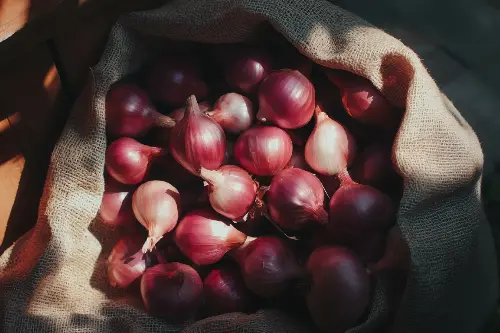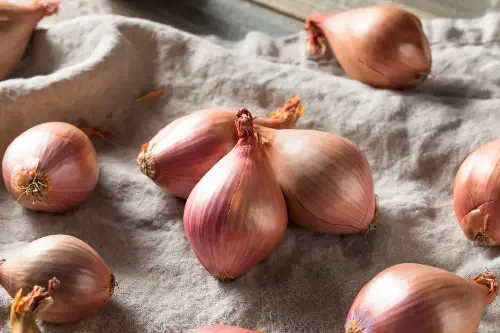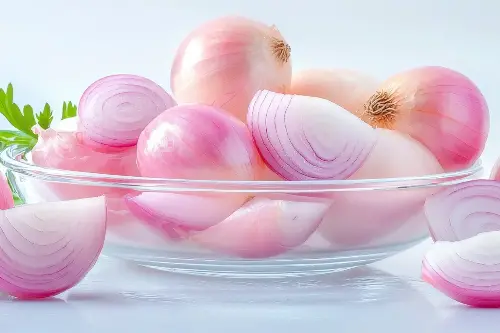Often tucked away among the vibrant tapestry of produce at your local market, the modest shallot is a powerhouse of nutrition that dances between the realms of garlic and onion. These small, unassuming bulbs are imbued with a remarkable array of health benefits and culinary applications that can transform both your meals and your wellbeing.

The shallot's unique composition of vitamins, minerals, and antioxidants is key to its health benefits. Rich in vitamin A, C, and some B vitamins, they also provide essential minerals such as potassium, iron, and manganese. Perhaps most importantly, shallots contain two vital phytochemical groups: flavonoids and sulfur-containing compounds, both renowned for their beneficial properties.
Antioxidant Abundance for Enhanced Well-being
The antioxidants in shallots, such as quercetin and allicin, are potent warriors in the fight against free radicals, unstable molecules that can damage cells and contribute to aging and diseases. Quercetin has been celebrated for its anti-inflammatory and antihistamine effects. Allicin, on the other hand, has antibacterial and antifungal properties that can help stave off infections.
Shallots also boast a considerable amount of vitamin C, a fundamental antioxidant that aids in immune system function, collagen production, and the absorption of non-heme iron. As a result, incorporating shallots into your diet could strengthen your body's natural defenses and contribute to healthier skin and tissues.
Supporting Heart Health and Circulation
This humble bulb packs a heart-friendly punch, with its flavonoids and sulfur compounds encouraging heart health. Regular consumption of shallots has been associated with reduced blood pressure and a decreased likelihood of clot formation thanks to their blood-thinning properties. The organosulfur compounds found in shallots are believed to relax blood vessels, enhance circulation, and lower cholesterol levels.

Dialling Down Diabetes Risk
Shallots may contribute positively to blood sugar regulation, owing to their moderate Glycemic Index (GI) and the presence of compounds that can aid the body's response to insulin. The antioxidant abilities of shallots can also protect pancreatic cells, potentially reducing the risk of diabetes.
Digestive Benefits and Detoxification Support
The fibre content in shallots is salient for digestive health, helping to keep bowel movements regular and potentially acting as a prebiotic—feeding the good bacteria in your gut. Their detoxification abilities spring from the detoxifying enzymes, such as glutathione transferases, which are triggered by the organosulfur compounds.
Culinary Alchemy with Shallots
Apart from their impressive health properties, shallots serve as versatile culinary chameleons, enriching an array of dishes with their delicate, slightly sweet flavour that is more refined than the raw punch of an onion.

The Subtle Edge of Raw Shallots
Raw shallots have a sharpness that can inject an electric zing into dressings, salsas, and salads. Finely diced, they meld wonderfully with vinegars and oils, creating an emulsion that can brighten and add depth to your vinaigrettes.
The Transcendent Sweetness of Cooked Shallots
When cooked, shallots undergo a magical transformation, mellowing into a sweet, caramelized delight. Their ability to enhance savoury dishes is unparalleled—whether diced into a stir-fry, roasted whole with vegetables, or gently sautéed to build the base of a sauce. Their subtle sweetness pairs impeccably with meats and seafood, and with a mere sprinkle of salt, their sugars caramelise to perfection.
Shallots in World Cuisine
Culinary traditions around the world celebrate the shallot. In French cuisine, they are the cornerstone of the classic sauce Béarnaise. Indian curries benefit from their depth of flavour. And Southeast Asian cuisines use them both fresh and fried for their added texture and taste dimensions.

Storing and Prepping Your Shallots
To fully reap the benefits of shallots, it is crucial to understand their proper storage and preparation. Shallots keep best in a cool, dry place away from sunlight, which can preserve their quality for up to a month. When ready to use, peel the skin, and depending on your recipe, mince, slice, or leave them whole. A tip to reduce tears? Chill the shallots before chopping.
In conclusion, shallots offer a symphony of health benefits and culinary possibilities. Introducing this flavourful bulb into your diet could contribute to improved overall health while adding dimension and depth to your cooking. Their subtle yet distinct taste has the power to refine any dish, while their robust nutritional profile supports your body’s functions. So next time you pass by the produce section, remember not to overlook this small but mighty vegetable—a true treasure in both the kitchen and the realm of health.
